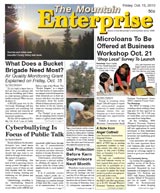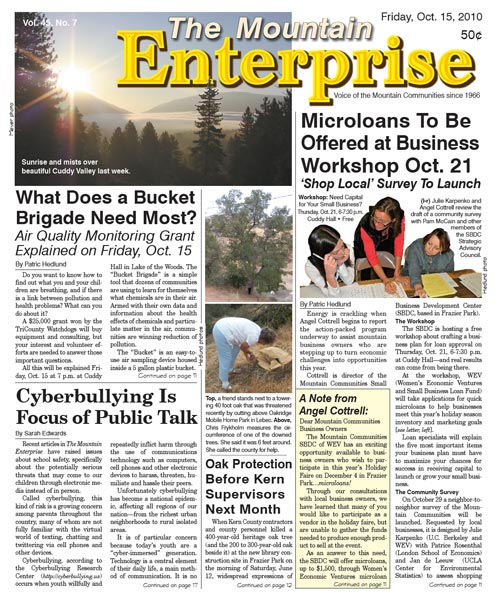By Sarah Edwards
Recent articles in The Mountain Enterprise have raised issues about school safety, specifically about the potentially serious threats that may come to our children through electronic media instead of in person.
Called cyberbullying, this kind of risk is a growing concern among parents throughout the country, many of whom are not fully familiar with the virtual world of texting, chatting and twittering via cell phones and other devices.
Cyberbullying, according to the Cyberbullying Research Center (http://cyberbullying.us) occurs when youth willfully and repeatedly inflict harm through the use of communications technology such as computers, cell phones and other electronic devices to harass, threaten, humiliate and hassle their peers.
Unfortunately cyberbullying has become a national epidemic, affecting all regions of our nation—from the richest urban neighborhoods to rural isolated areas.
It is of particular concern because today’s youth are a “cyber-immersed” generation. Technology is a central element of their daily life, a main method of communication. It is no longer simply a side activity as the telephone and other older forms of media have been.
A dramatic shift from personal to digital has been described by some as the greatest generational shift in social thinking since the sexual revolution of the 1960s. Estimates are that two-thirds of our youth go online every day for schoolwork, to “text” friends, play games, create art and for a wide array of other activities.
But our children are often unaware of the psychological impact of their use of digital social media.
Current research shows that up to 40 percent of youth are involved in cyberbullying—either as the perpetrators or as the victims. This is a far wider level of involvement than is seen in traditional in-person aggression.
Traditional bullying behavior is associated with catastrophic violence. Research shows it is the most common reason students bring weapons to school. But the risks associated with cyberbullying are more subtle and often invisible to adults.
For one thing, its victims are prone to greater depression and increased suicide risk. Worse, the strategies used to respond to traditional bullying are inadequate to prevent or treat cyberbullying. But research shows that unchecked cyberbullying can destroy a school environment.
Academic performance decreases, person-to-person aggression increases and suicide gestures begin to emerge in students who never seemed to manifest a mental disorder.
When we don’t intervene effectively, cyberbullying victims are left feeling powerless and hopeless in a torturous way that we adults cannot begin to comprehend without knowledge of this communication media.
It is incumbent upon us as adults to gain a basic understanding of how this new “cyber generation” is thinking, feeling, and acting so we can help prevent the emotional harm that is occurring right in the very homes and schools we have built for our children’s safety.
We can’t say “just turn the dang thing off!” or “give me that cellphone!” This is a message that we don’t understand their world. Their world is here to stay. Digital technology is not going away. We must join this world which surrounds our children and give them the same guidance that we do for any other activity.
Shelia Clark, Ph.D. and Sarah Edwards, Ph.D. will be offering a free workshop for parents on cyberbullying on Saturday, Oct. 30 from 4-6 p.m. at Cuddy Hall. Types of cyberbullying, such as flaming, baiting, impersonation, photos and video will be discussed. We’ll look at differences between cyberbulling and schoolyard bullying, including motivations behind them and social and psychological effects.
The workshop will provide information on sexting, social networking, legal issues, parental and school responsibilities, as well as strategies for prevention, response and treatment.
We will discuss the positive role our schools can take in helping our youth battle the cultural cyberbully wave, and especially, how a well-prepared Acceptable Use Policy (AUP) can provide an avenue for schools to assist in handling all aspects of cyberbullying, even those occurring off-campus and outside of school time.
Date: Saturday, Oct. 30
Time: 4-6 p.m.
Location: Cuddy Hall, LOW
RSVP: 661-242-1583
The Cyberbullying Free Public Service Workshop is sponsored by California Family Counseling Network, Inc., and Let’s Live Local. Donations accepted.
This is part of the October 15, 2010 online edition of The Mountain Enterprise.
Have an opinion on this matter? We'd like to hear from you.


